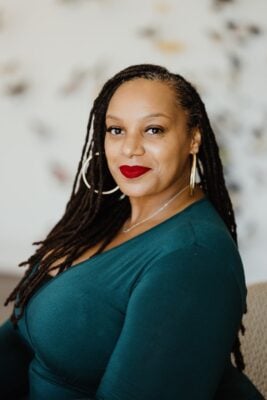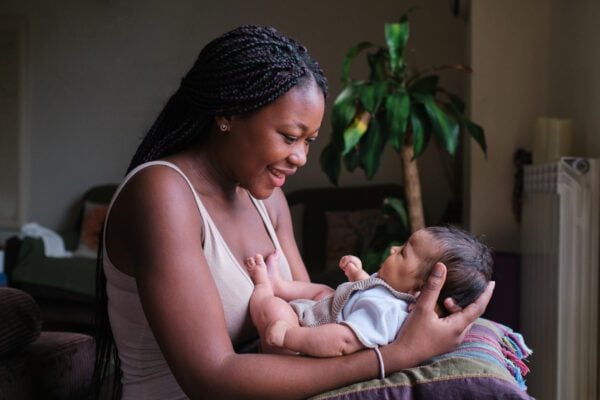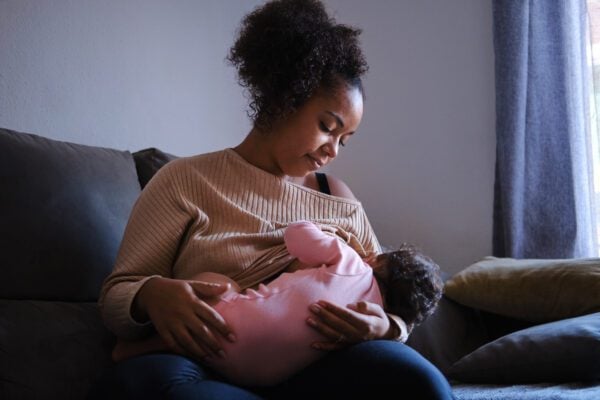The Indiana Black Breastfeeding Coalition (IBBC) is using Breast Cancer Awareness Month to shed light on a lesser-known form of prevention — breastfeeding.
Through its statewide “Breastfeeding for Breast Health” campaign, IBBC aims to educate families about how breastfeeding not only nourishes babies but also protects mothers from certain diseases.
The Recorder spoke with Joi Crenshaw, certified professional midwife and president of the Indiana Black Breastfeeding Coalition, about the inspiration behind the campaign, barriers facing Black mothers, and how the community can get involved.

Responses have been edited for length and clarity.
What inspired the launch of this campaign?
Crenshaw: We’re always looking for ways to encourage Black families to breastfeed, so we’re seeking those things that will help them understand why it’s beneficial. Talking about how it lowers the lifetime risk of breast cancer is one of those things that feels like a hidden benefit, because we don’t talk about it enough.
Our goal is always to increase overall health in our community, so we ensure that they understand the connection between breastfeeding and breast health.

Can you explain how breastfeeding plays a role in lowering a mother’s risk of developing breast cancer?
Crenshaw: One of the main things is that it lowers estrogen levels, so that contributes to decreasing breast cancer risk, and it also decreases the inflammatory process. Your body will naturally produce breast milk when you have a baby, but if the milk is not expressed from your breasts, it can trigger an inflammatory process in the breast.
Black women are statistically less likely to breastfeed and more likely to die from breast cancer. What are some of the systemic or cultural barriers contributing to this gap?
Crenshaw: (Black women) are less likely to have folks talk to us about breastfeeding when we are pregnant. We are also offered formulas more quickly and more often than our white counterparts, and so that definitely has an impact.
Culturally, there was a lot of push around (the time) when the formula was made available. It wasn’t something that we could afford, and so it then became a status symbol when we were able to give our babies formula.
When we think about our history in this country, we’ve always had to work. Sometimes, we even had our babies in the field and then continued working afterwards. We had a baby and just put them on our chest and kept pushing.
Those things live in our DNA. That pain has definitely been passed down through generations.
How is IBBC working to close those gaps here in Indiana?
Crenshaw: We talk about breastfeeding in a cultural context, and so we’re uniquely positioned to be able to speak to those cultural nuances for us.
Because we are who we are, we can talk to the grandparents and the grandmothers who have their ideas about breastfeeding because of their own experiences or because of the history and the pain that’s been passed down in their family. It just feels like a safe space for folks to come and be heard. Talking to someone else who looks like you instantly removes some of the barriers.
Over the years, have you seen attitudes or awareness around breastfeeding change in Indiana’s Black communities?
Crenshaw: We have. When I ask the question now, I just had a group last night, and every mom that was in the room, when I asked if they planned to breastfeed their baby, everybody put their hand up. And even just a few years ago, I would get a few hands, but some people would say they weren’t sure.

What kind of response from this campaign do you hope to see from the public and the health care community?
Crenshaw: Yeah, I am hoping that everybody will, you know, be set on fire by it, and really, like, connect the dots to it. Because we can push the message, but if the larger hospital systems and health care providers are not discussing why it’s essential, we can only go so far.
We genuinely need champions in all these areas of the community and the hospital system to discuss it. And really help educate patients with that.
For mothers who may feel uncertain or unsupported in their breastfeeding journey right now, what message do you want them to hear from this campaign?
Crenshaw: I would say, one, don’t give up. Two, reach out for support. Because it is, again, it’s not just about the baby; it’s also about the mom’s health. And it is the overall impact on your health. It’s worth working through the kinks and figuring out where your support lies.
How can folks in the community get involved, either as volunteers, donors or advocates? How can they help?
Crenshaw: We are currently running a volunteer campaign that we have launched. Visitors can easily donate by clicking on our donation link on our website. All the donations are tax-deductible.
For more information about the Indiana Black Breastfeeding Coalition or to get involved, visit indianablackbreastfeeding.org.
Hanna Rauworth is the Health & Environmental Reporter for the Indianapolis Recorder Newspaper, where she covers topics at the intersection of public health, environmental issues, and community impact. With a commitment to storytelling that informs and empowers, she strives to highlight the challenges and solutions shaping the well-being of Indianapolis residents.









